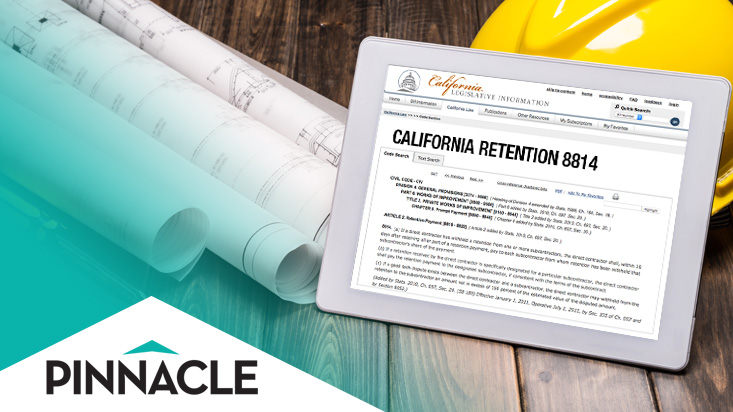Retention is an agreement, which is often forged between contractors and employers. In cases where a subcontractor is involved, the retention may also apply to this party. The aim of retention is to hold some of the total payment back and then release it once the project is completed in line with the terms of the agreement. In many cases, retention is paid upon completion without any issue, but what happens when a contractor or subcontractor withholds retention? What can you do to protect yourself and how does the law handle withholding of retention?
What the law says about retention
 Recently, a ruling in California highlighted the importance of transparency and fairness in the process of establishing and following retention guidelines. The Civil Code Section 8814 states that a contractor is required to pay retention to subcontractors within a period of 10 days once a project has been completed, and the owner has released retention to the contractor. In a case where the fee is withheld, a fee of 2% per month can be added to the value of the withdrawn retention in addition to attorney charges. The exception is a dispute made in ‘good faith.
Recently, a ruling in California highlighted the importance of transparency and fairness in the process of establishing and following retention guidelines. The Civil Code Section 8814 states that a contractor is required to pay retention to subcontractors within a period of 10 days once a project has been completed, and the owner has released retention to the contractor. In a case where the fee is withheld, a fee of 2% per month can be added to the value of the withdrawn retention in addition to attorney charges. The exception is a dispute made in ‘good faith.
The trouble with the term ‘good faith’ is that it represents a gray area. What exactly does ‘good faith’ mean, and how can the law distinguish between disputes made in ‘good faith’ and those that don’t have any real substance? In the California case, the Supreme Court confirmed that a ‘good faith dispute’ can only maintain its status if the dispute relates to a disagreement over the payment of retention. In simple terms, the court suggests that retention payments should be made swiftly to avoid non-compliance with the Prompt Payment Statutes. In this particular case, which involved a contractor and a subcontractor, retention was withheld due to disagreements about costs and additional work claims made by the subcontractor against the contractor. The value of retention was not a subject of debate, but the contractor withheld 150% of the value of the retention under the safety umbrella of Prompt Payment Statutes. The contractor and subcontractor were at loggerheads over the legal interpretation and role of a ‘good faith dispute,’ and eventually, the court intervened.
The court chose to support the stance of the subcontractor, insisting that a ‘good faith dispute’ should relate solely to the type of payment that had been withheld, in this case, retention. This ruling also highlights the importance of making prompt payments in line with legislation to which contractors and subcontractors are required to comply.
The California case underlines the importance of being aware of the Prompt Payment Statutes and should serve as a warning to contractors who are keen to avoid disputes and delays.
How Pinnacle Surety can provide protection
 When you take on work, it’s wise to consider investing in different types of surety bond. In many cases, individual state statutes outline the requirements, which determine which types of surety bond are suited to specific projects. Often, performance bonds are recommended, but you can further enhance protection by considering a retention bond.
When you take on work, it’s wise to consider investing in different types of surety bond. In many cases, individual state statutes outline the requirements, which determine which types of surety bond are suited to specific projects. Often, performance bonds are recommended, but you can further enhance protection by considering a retention bond.
Performance and retention bonds
A performance bond is not the same as a retention bond. To better understand the difference, it’s beneficial to delve a little deeper into what retention is, and how it impacts the parties involved in the project. Retention is a financial product, which is used by contractors to ensure that subcontractors fulfill their contractual obligations. Retention helps to protect against failure to finish a project and mistakes and defects, which may affect the completion date and the client’s desire to settle the final payment. Retention is essentially a safety net. The process is designed to reward those involved upon completion of the project, but sadly, it’s not always as simple as it should be. There are cases where retention is withheld.
It’s very common for contractors to take out performance bonds. Performance bonds are fundamentally designed to ensure that the contractor delivers the promised outcome in line with the requirements of the contract. If you already have a performance bond posted you may question why you need a retention bond. The answer lies in the fact that retention bonds provide additional protection and increase the chances of swift payments and work carried out in good faith. A retention bond involves three parties, and surety is guaranteed by the bond provider. If the contractor fails to fulfill the requirements of the contract, the retention bond replaces cash retention, and the client receives their payment swiftly without any need to enter into disputes or wait for a decision. The retention bond is payable even if the contractor has already received compensation. Another advantage of a retention bond is that it gives contractors the opportunity to correct defects, which could put the project at risk. The defect is flagged up, a time period is established to address the issue, and the project moves forward as planned.
 A retention bond from Pinnacle Surety provides financial protection for clients, but it also has benefits for the contractor, as they are not forced to put down a cash retention payment. If there are issues, the retention bond can be released in line with the terms of the agreement with the surety provider, with no need to chase payments. With a retention bond from Pinnacle Surety, you have peace of mind that your bond provider has your best interests at heart.
A retention bond from Pinnacle Surety provides financial protection for clients, but it also has benefits for the contractor, as they are not forced to put down a cash retention payment. If there are issues, the retention bond can be released in line with the terms of the agreement with the surety provider, with no need to chase payments. With a retention bond from Pinnacle Surety, you have peace of mind that your bond provider has your best interests at heart.
A recent court ruling in California has sent an important message to contractors and subcontractors. Retention is a financial agreement, which involves setting aside a sum of money, which is released upon successful completion of a project. If everything runs smoothly, all parties will be happy when the final day of work draws to a close. Unfortunately, there are often hiccups, which throw a wrench in the works in terms of when retention is released. This recent case highlights the importance of understanding Prompt Payment Statutes and being aware of steps you can take to protect against disputes and discover a solution rapidly if things don’t go to plan. Investing in a performance bond is a requirement for many projects, but protection can be enhanced even further with the acquisition of a retention bond from Pinnacle Surety.
For more information, call Pinnacle Surety at (844) 612-7238


